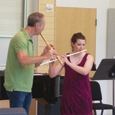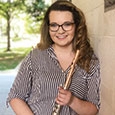
As the end of the school year approaches, it is time to plan your summer vacation. For student flutists, there are wide variety of opportunities that will allow you to grow and develop as a musician. Over the years, I have attended summer masterclasses, NFA Conventions, and orchestral and chamber music programs in addition to private study with a variety of teachers. When I returned to school, my professors commented that I made as much progress in the three summer months as during the entire previous academic year. These experiences propelled me forward in my studies and prevented me from regressing.
Deciding on a Program
Each type of summer program presents its own distinctive benefits. Masterclasses offer the chance to study closely with a teacher and allow you to observe how the teacher interacts with others. Masterclasses are designed to expose you to a wide array of repertoire, flutists of various performance levels, and one or more flute professors. In addition to meeting new flute friends, there is the opportunity to work with a teacher with whom you may be interested in studying with in future degree programs. Many of the teachers I worked with in masterclasses ended up being teachers that I was interested in studying with in graduate school. The experiences also gave me a leg up on the competition as I had already forged a personal connection with the professors.
During my undergraduate years, I also attended summer orchestral programs to develop and hone my skills. Prior to attending my first summer orchestral program, I had not been placed in the orchestra at school. After my first orchestral intensive, I was placed in orchestra every semester for the rest of my undergraduate career, with consistently strong placement within the section. The opportunity to play and perform orchestral repertoire every day, as well as work with outstanding conductors, helped me figure out what I needed to do to become a strong orchestral player.
While finances may be a prohibiting factor for some summer programs, do not rule out the possibility of summer study. Many programs offer scholarships, financial aid, and work study opportunities. Additionally, there are programs in the United States and abroad that offer a small stipend for students to further their studies.
Networking
One of the biggest benefits from my years of summer study has been the chance to meet teachers, conductors and fellow musicians who will eventually become your colleagues. Almost every summer, I have run into someone I had met at a previous program. The chance to work with multiple conductors and teachers is priceless. It is comforting to walk into an audition with a teacher or conductor you already know.
It is advantageous to have friends in schools across the country who can show you around campus and perhaps offer you a place to stay while on the audition circuit. Leaving my undergraduate university was much easier knowing I was coming to a school where I already knew a few people.
Opportunities to Explore
In addition to growing as a musician, summer study provides the opportunity to grow as a person. Attending a summer program in a different area of the country is a great way to discover another environment, perhaps a new region or even a new country. Last summer, I went to both the mountains of Tennessee and the beaches of Cape Cod for summer festivals. You can learn about the politics and history of the region, sightsee, explore new libraries, or even learn a new language.
Lifelong Skills
Summer study provides an opportunity to take risks without the consequence of a bad grade or poor ensemble placement. During my first orchestral program, I was placed on piccolo for Shostakovich’s Symphony No. 5, despite having never played piccolo in an orchestra before. Terrified, I came to the first rehearsal filled with fear and hesitation until my teacher pulled me aside and said “Just go for it! Who cares if you mess up, you’re on a mountaintop! Who is going to hear you – the cows?” I approached the rest of the week with excitement for the challenge and had a great experience in the concert. Since then, I have discovered a true passion for piccolo and have been given piccolo parts in most of the orchestras I play with because the conductors notice I am not afraid of the instrument.
Due to the short nature of summer programs, everything is intensified from the rehearsals to the concert cycles. This gives students a feel for a professional music career. I saw tremendous improvements in my sightreading skills and part preparation because of this fast-paced schedule. I have changed how I approach my preparation for ensembles and am known as the go-to substitute flutist for any of the ensembles or chamber groups at my graduate school because I can quickly learn a part and fit into a new ensemble. I have also subbed with local orchestras which has led to even more opportunities. This exposure to a wide variety of orchestral and chamber repertoire has made me a more well-rounded and knowledgeable musician.
At my graduate school we frequently hold orchestral reading sessions where we play two to three works that will not be programmed on any concerts. For most people, nearly every piece is new to them, but at every session in the fall, I found that I had already performed each of the pieces. This made me stand out to the conductor as an informed, experienced musician.
Summer study is a fantastic way to stay in shape over the long break. It is also a great opportunity to expand your musical horizons, make new friends, and return to school a better player.






